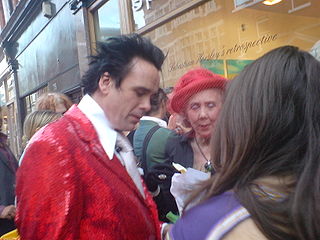A Quote by Susan Minot
A lot of readers want characters to behave in a responsible way, or they want to understand the characters' dilemma and act, in a way, on their behalf.
Quote Topics
Related Quotes
You know, women are acting the way they want to act now. Years ago they would hide it in the way they dressed, the way they speak, even the way they act in bed. Today, they're doing the same thing, but they're dressing the way they want to be treated and, when you're with them, acting the way they want to act. And you know, honesty is the best policy. I love that.
I do not invent characters. There they are. That's who they are. That's their nature. They talk and they behave the way they want to behave. I don't have a character behaving one way, then a point comes in the play where the person has to either stay or leave. If I had it plotted that the person leaves, then the person leaves. If that's what the person wants to do. I let the person do what the person wants or has to do at the time of the event.
...But I don't think I'm the only person who is tired of books and movies full of paper-doll characters you don't care about, who have no self-respect and no respect for anybody or any institution....And I don't want to sound preachy or Victorian, but I'm tired of amorality in fiction and in real life. Immorality is a fascinating human dilemma that creates suspense for the readers and tension for the characters, but where is the tension in an amoral situation? When people have no personal code, nothing is threatening and nothing is meaningful.
I'm mostly interested in characters and how they manifest themselves in their relationships. I'm delighted that people relate to the characters in 'Bojack,' and hopefully they will too to the characters in 'Undone.' If they understand themselves or feel seen in a new way, I think that's a wonderful thing.
In terms of style, I think the memoirist should have a novelist's skill and all the elements of a novelist's toolbox. When I read a memoir, I want to really, deeply experience what the author experienced. I want to see the characters and hear the way they speak and understand how they think. And so in that way, writing a memoir feels similar to writing a novel.
I think that I write much more naturally about characters in solitude than characters interacting with others. My natural inclination - and one that I've learned to push against - is to give primacy to a character's interior world. Over the three books that I've written, I've had to teach myself that not every feeling needs to be described and that often the most impactful writing more elegantly evokes those unnamed feelings through the way characters speak and behave.
When writers are self-conscious about themselves as writers they often keep a great distance from their characters, sounding as if they were writing encyclopedia entries instead of stories. Their hesitancy about physical and psychological intimacy can be a barrier to vital fiction. Conversely, a narration that makes readers hear the characters' heavy breathing and smell their emotional anguish diminishes distance. Readers feel so close to the characters that, for those magical moments, they become those characters.







































